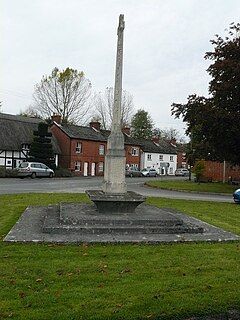King's Somborne War Memorial
| King's Somborne War Memorial | |
|---|---|
| United Kingdom | |
 |
|
| For men from King's Somborne killed in the First World War | |
| Unveiled | 27 March 1921 |
| Location |
51°04′38″N 1°29′15″W / 51.077201°N 1.487495°WCoordinates: 51°04′38″N 1°29′15″W / 51.077201°N 1.487495°W Romsey Road, King's Somborne, Hampshire near |
| Designed by | Sir Edwin Lutyens |
|
Listed Building – Grade II
|
|
| Official name | Kings Somborne War Memorial |
| Designated | 7 February 1986 |
| Reference no. | 1093814 |
King's Somborne War Memorial is a First World War memorial in the village of King's Somborne in Hampshire in southern England. The memorial was designed by Sir Edwin Lutyens and unveiled in 1921; it is a grade II listed building.
In the aftermath of the First World War and its unprecedented casualties, thousands of war memorials were built across Britain. Amongst the most prominent designers of memorials was the architect Sir Edwin Lutyens, described by Historic England as "the leading English architect of his generation". Lutyens designed the Cenotaph on Whitehall in London, which became the focus for the national Remembrance Sunday commemorations, as well as the Thiepval Memorial to the Missing—the largest British war memorial anywhere in the world—and the Stone of Remembrance which appears in all large Commonwealth War Graves Commission cemeteries and in several of Lutyens's civic war memorials. The King's Somborne memorial is one of fifteen War Crosses by Lutyens, all sharing a broadly similar design; another, , is situated in the nearby town of .
Prior to the outbreak of war, Lutyens established his reputation designing luxurious country houses for wealthy clients. Like many of his war memorials, the commission for King's Somborne originated with a pre-war client. Lutyens designed Marshcourt, a country house near Stockbridge, for Herbert Johnson at the turn of the twentieth century; during the First World War, Johnson and his wife Violet ran a 60-bed military hospital out of Marshcourt and after the Armistice, Johnson was adamant that King's Somborne and Stockbridge should both have a memorial to the war dead.
...
Wikipedia
